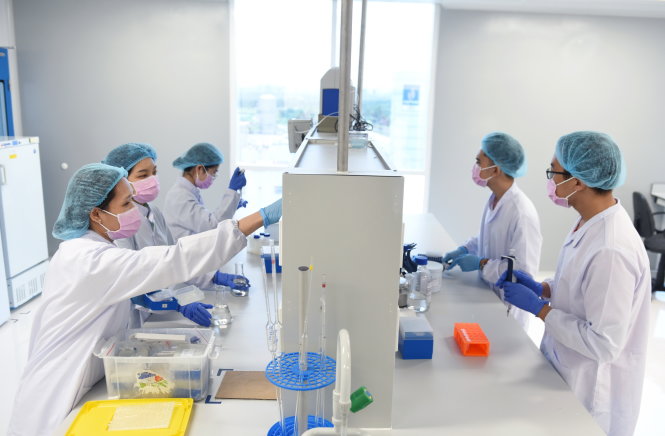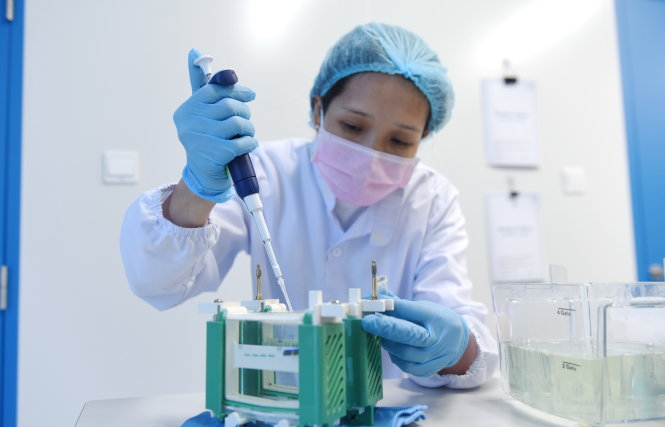Nanocovax – one of Vietnam’s domestically developed vaccines for COVID-19 – has officially received volunteers for its human clinical trial phase. Meanwhile, three other candidates are each running their own race to come up with an approved COVID-19 vaccine for mass inoculation.
Developed by Vietnamese manufacturer Nanogen Pharmaceutical Biotechnology, Nanocovax will be brought to human trials under the supervision of the Vietnam Military Medical University.
The vaccine roadmap
Just one year ago on December 3, the first case of novel coronavirus infection was detected in China. Named COVID-19, the disease stemming from the SARS-CoV-2 pathogen managed to spread across the world, causing the most contagious and precarious epidemic in the last 100 years.
In the face of a looming global crisis, governments and pharmaceutical companies from all over the world spared no time to kickstart the development of their own vaccine.
Four Vietnamese candidates also stepped into the game, including Nanogen, the state-owned Vaccine and Biological Production Company No. 1 (VABIOTECH), the Institute of Vaccines and Medical Biologicals (IVAC) and the Center for Research and Production of Vaccines and Biologicals (Polyvac).
At the time, these firms set humble goals, only looking to gain access to the latest technology and develop a manufacturing procedure.
In early May, the vaccine developers mobilized adequate resources, updated infrastructures and facilities to obtain a central-level priority status for their research of a COVID-19 vaccine.
However, the expert’s work even predated the authority approval: A group of VABIOTECH has sequestered themselves in the lab and commenced trials of a vaccine prototype on rats since March after returning from the United Kingdom.
Meanwhile in July, vaccine samples of the candidate IVAC were shipped to the United States for appraisal.
But for the moment, Nanogen has emerged as the front runner.
On December 10, the firm announced the search for volunteers to receive a vaccine shot for an experiment starting December 17.
Such achievements might look like the heroic feats of a select few, but the individual hurdles encountered during the process shows a team effort.
“It is obvious that no one would like to see a large number of COVID-19 cases, but the very fact that Vietnam does not see many transmissions greatly interfered with our pathology sampling process. We also don’t have access to labs with adequate space to implement tests on animals,” A Nanogen representative revealed.
“All other labs in the world are crammed with their own development of vaccines, while reports on phase one's clinical trial were also scarce,” he added.
The representative also cited a lack of solid regulation framework to guide the production and registration of a COVID-19 vaccine as a barrier against their efforts.
This is why Vietnam’s development progress of a vaccine fell behind other countries, he speculated.
During the past months, many dialogues have been made between the Ministry of Health and the manufacturers to complete pre-clinical evaluations and resolve existing issues while also maintaining scientific standards.
The ministry also asked the National Institute for Vaccines and Biologicals, the National Institute of Hygiene and Epidemiology, and the Ho Chi Minh City Pasteur Institute, among others, to assist four manufacturers in appraising all lab reports, challenge trials, and most importantly detecting the safe dosage of vaccine on animals.
The efforts brought forth positive results.
In August, Nanogen announced their success in producing four types of antibodies using samples extracted from patients who naturally recovered from COVID-19.
Instead of creating just one, the researchers attempted to synthesize four types of antibodies into a sequence and deploy them for injections as well as spray vaccines, which can effectively “lock” multiple gateways that allow the virus to infiltrate our cells.
The researchers wrapped up the development phase and are in position to manufacture scFv and peg-scFv, fragments of antibodies that targets the S protein on the SARS-CoV-2 virus.
The researchers have already implemented strict pre-clinical tests on adaptive immune responses on lab rats and monkeys before sending the vaccine to the human trial phase.
“The tests proved the vaccine’s efficacy in triggering strong immune responses. Toxicity tests on rats, hamsters, rabbits and monkeys all demonstrated adequate safety from the vaccine,” said Nguyen Phuong Thuy, head of Nanogen’s Medical Department, one of the two first researchers to join the development of the Nanocovax.
The pharma company has also referenced clinical research from foreign institutes to devise a set of criteria for safety and efficacy of the vaccine based on ecological and epidemiological peculiarities of Vietnam.
The guidelines also laid the framework for phase two of clinical trial to be started immediately after the first phase is completed.
According to Hoang Hoa Son from the Administration of Science, Technology and Training under the Ministry of Health, there are at least 51 vaccine developers worldwide who are implementing human clinical trial of COVID-19 vaccine, with Vietnam’s Nanogen just named the 52nd.
IVAC and VABIOTECH are also anticipated to join the list with their own vaccine tests on human slated for February and March 2021 respectively.
“We’re holding high hopes,” said Nguyen Ngo Quang, deputy head of the Administration of Science, Technology and Training.
 |
| Researchers are seen during the development of Nanocovax at Nanogen Pharmaceutical Biotechnology. Photo: Duyen Phan / Tuoi Tre |
Flu shots and spray vaccine
The first COVID-19 vaccine developer to gain authority approval to human tests in Vietnam, Nanogen expects their work to be Vietnam’s first to be launched to the market.
They claimed to prioritize domestic vaccine demand to assist the government in pushing back the epidemic.
“The price for the vaccine has yet to be set, but will try to ensure an accessible price for all Vietnamese residents,” Nanogen vowed.
While Nanogen and IVAC are working on intravenous forms of the vaccine, VABIOTECH is in development for a novel type of spray vaccine, where users will not have to get a painful injection.
According to Quang, all visions are tentative at the moment, but he highly appreciates the efforts of manufacturers in branching out, which help the communal progress of Vietnam to run almost parallel with global advances.
“According to the World Health Organization, epidemiological safety can be attained with only 20-40 percent of a populace vaccinated. In Vietnam, that would mean 20-40 million of residents to receive shots for the community to be safe,” Quang said.
As per the manufacturing scale announced by Vietnamese developers, Vietnam is capable of producing tens of millions of COVID-19 shots per year.
The enormous tally is by no means exaggerating as the country already has a developed vaccine manufacturing system since the 1960s, capable of producing 12 out of 14 doses required for the government-backed Expanded Program on Immunization.
With enough positive indications, Vietnamese can safely anticipate a homegrown COVID-19 vaccine to be launched on the market in 2021.
Like us on Facebook or follow us on Twitter to get the latest news about Vietnam!



















































